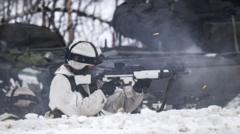As Sweden navigates its membership in NATO, it faces escalating threats from Russia, heightened intelligence activities, and a challenging security landscape.
**Sweden Identifies Russia as Top Security Threat Amid Rising Tensions**

**Sweden Identifies Russia as Top Security Threat Amid Rising Tensions**
Sweden's security service emphasizes growing concerns over Russian activities and their implications for national and NATO security.
Sweden's national security agency, Sapo, has identified Russia as the most significant threat to the country's security, citing the nation's aggressive stance towards the West in its recent annual report. The agency highlights that Sweden's ascension to NATO has bolstered its protective measures but simultaneously provoked escalated intelligence activities from Russia.
Charlotte von Essen, head of Sapo, expressed concerns about the current security climate, warning that it could deteriorate unpredictably. She noted a serious and evolving security situation, marked by foreign actors engaging in hybrid warfare and rising instances of violent extremism. The report underlines the tangible risk posed by these factors, exacerbated by Russia's heightened offensive and risk-prone behavior in light of reinforcement of defenses across Sweden and Europe.
Following Sweden's NATO membership last year, a strategic decision made amid the Russian invasion of Ukraine in February 2022, there have been predicated fears of potential warfare directly impacting Sweden. This is echoed by previous warnings from civil defense officials about the likelihood of conflict due to ongoing Russian aggression.
Sapo's report indicates that Russia's intelligence operations chiefly aim to disrupt NATO's unity while undermining Western support for Ukraine and circumventing sanctions. Russian security elements are reportedly employing an expanding array of resources and platforms for espionage, although some capabilities have been hindered by the expulsion of intelligence agents.
In light of these threats, von Essen urged the Swedish populace to remain vigilant against pervasive anti-state narratives and conspiracy theories that could destabilize societal structures, emphasizing the need to adapt without normalizing the current perilous situation.
The report also alludes to several suspicious incidents affecting infrastructure, fueling speculation about responsible nations. This follows a string of damaging events targeting undersea communications and energy installations since the onset of the Ukraine conflict, which prompted NATO to initiate a maritime surveillance mission.
Sapo acknowledges not only Russia as a primary threat but also points to substantial risks presented by Iran and China. For instance, Iranian intelligence has been linked to cyber-attacks, including a targeted operation that transported 15,000 deceptive messages to Swedish civilians in response to public Quran burnings.
As the report progresses, it warns of a diversification in terrorism threats that now transcend traditional ideological boundaries. Younger individuals, often radicalized online or influenced by foreign powers, have been increasingly involved in violent incidents, with notable attacks occurring in neighboring European countries.
Sweden is grappling with the aftermath of a tragic mass shooting incident in Orebro, where nine lives were lost, highlighting vulnerabilities at home amidst looming external threats. The overarching security alert level remains at four on a five-point scale, with ongoing concerns regarding both violent Islamic extremism and right-wing terrorism shaping the nation’s evolving security landscape.
Charlotte von Essen, head of Sapo, expressed concerns about the current security climate, warning that it could deteriorate unpredictably. She noted a serious and evolving security situation, marked by foreign actors engaging in hybrid warfare and rising instances of violent extremism. The report underlines the tangible risk posed by these factors, exacerbated by Russia's heightened offensive and risk-prone behavior in light of reinforcement of defenses across Sweden and Europe.
Following Sweden's NATO membership last year, a strategic decision made amid the Russian invasion of Ukraine in February 2022, there have been predicated fears of potential warfare directly impacting Sweden. This is echoed by previous warnings from civil defense officials about the likelihood of conflict due to ongoing Russian aggression.
Sapo's report indicates that Russia's intelligence operations chiefly aim to disrupt NATO's unity while undermining Western support for Ukraine and circumventing sanctions. Russian security elements are reportedly employing an expanding array of resources and platforms for espionage, although some capabilities have been hindered by the expulsion of intelligence agents.
In light of these threats, von Essen urged the Swedish populace to remain vigilant against pervasive anti-state narratives and conspiracy theories that could destabilize societal structures, emphasizing the need to adapt without normalizing the current perilous situation.
The report also alludes to several suspicious incidents affecting infrastructure, fueling speculation about responsible nations. This follows a string of damaging events targeting undersea communications and energy installations since the onset of the Ukraine conflict, which prompted NATO to initiate a maritime surveillance mission.
Sapo acknowledges not only Russia as a primary threat but also points to substantial risks presented by Iran and China. For instance, Iranian intelligence has been linked to cyber-attacks, including a targeted operation that transported 15,000 deceptive messages to Swedish civilians in response to public Quran burnings.
As the report progresses, it warns of a diversification in terrorism threats that now transcend traditional ideological boundaries. Younger individuals, often radicalized online or influenced by foreign powers, have been increasingly involved in violent incidents, with notable attacks occurring in neighboring European countries.
Sweden is grappling with the aftermath of a tragic mass shooting incident in Orebro, where nine lives were lost, highlighting vulnerabilities at home amidst looming external threats. The overarching security alert level remains at four on a five-point scale, with ongoing concerns regarding both violent Islamic extremism and right-wing terrorism shaping the nation’s evolving security landscape.























